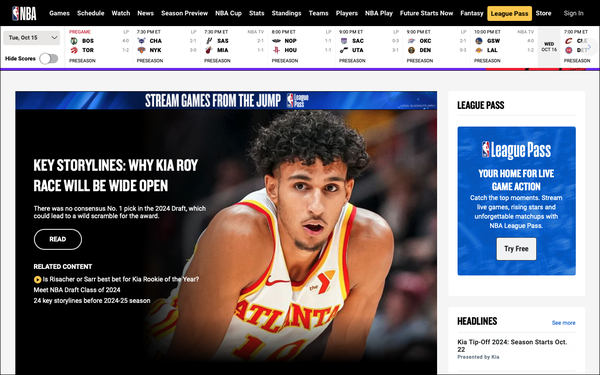
Siding against the National Basketball
Association, a federal appellate court restored claims that the group violated a 36-year-old video privacy law by embedding Meta Platforms' analytics tool, the Meta Pixel, on NBA.com.
The
ruling, issued Tuesday by the 2nd Circuit Court of Appeals, comes in a closely watched battle over how the Video Privacy Protection Act (VPPA) applies to online services that integrate third-party
analytics tools. The 1988 law, which was passed after a Maryland store disclosed the video rental history of Supreme Court nominee Robert Bork to a newspaper, prohibits video rental companies from
disclosing personally identifiable information about consumers' viewing history without their permission.
Though the law predates the modern internet, judges across the country have said
the statute covers streaming video services. But other questions about the law's applicability to online services -- including whether people who watch free videos are "consumers" -- are still working
their way through the courts.
advertisement
advertisement
The 2nd Circuit on Tuesday said the term "consumer" should be interpreted broadly, and that it includes web users who provide certain personal information in
exchange for content.
“The VPPA is no dinosaur statute,” Circuit Judge Beth Robinson wrote in an opinion joined by Judges Reena Raggi and Eunice Lee.
“Congress
deployed broad language in defining the term 'consumer,' showing it did not intend for the VPPA to gather dust next to our VHS tapes,” the judges added. “Our modern means of consuming
content may be different, but the VPPA’s privacy protections remain as robust today as they were in 1988.”
The opinion comes in a dispute dating to 2022, when California resident
Michael Salazar alleged in a class-action complaint that the National Basketball Association violated the federal video privacy law by sharing his personally identifiable viewing history at NBA.com
with Facebook, via the Meta Pixel -- analytics code that automatically transmits information about website visitors.
Last year, U.S. District Court Judge Jennifer Rochon in the Southern
District of New York dismissed Salazar's complaint, ruling that he wasn't a “subscriber” to NBA.com, because that site didn't require registration to access videos. The video privacy
statute defines “consumer” as a “renter, purchaser, or subscriber” of services from a video tape service provider.
Salazar appealed, arguing that he should be
considered a “subscriber” because he had signed up for an online NBA newsletter that offered links to videos on NBA.com.
The National Basketball Association countered that
registering for an email newsletter doesn't equate to “subscribing” to videos.
“None of the commonly understood indicia of a 'subscriber' relationship, vis-à-vis video
content, are meaningfully present here,” the organization argued to the 2nd Circuit.
The appellate court sided with Salazar, ruling that his allegations, if proven true, could establish
that he was a “subscriber” to NBA.com because he provided “valuable personal information in exchange for access to the online newsletter.”
“Although Salazar does
not allege that he paid the NBA money, he does allege that he provided the NBA with his personal information when he signed up for the newsletter,” Robinson wrote, adding that in Salazar
provided the NBA with his email address, IP address and “cookies associated with his device.”
The dispute drew the attention of the U.S. Chamber of Commerce, which backed the
sports organization. The Chamber of Commerce argued both that Salazar isn't a “subscriber,” and that his lawsuit is part of a scheme to end online ad targeting.
“Salazar and
other plaintiffs are attempting to use the VPPA as a means to effectively abolish targeted advertising,” the business organization wrote in a friend-of-the-court brief.
“If
Salazar’s theory prevails, no business will be able to share potentially identifying information about video viewers with third parties without risking class action liability,” the Chamber
of Commerce added.